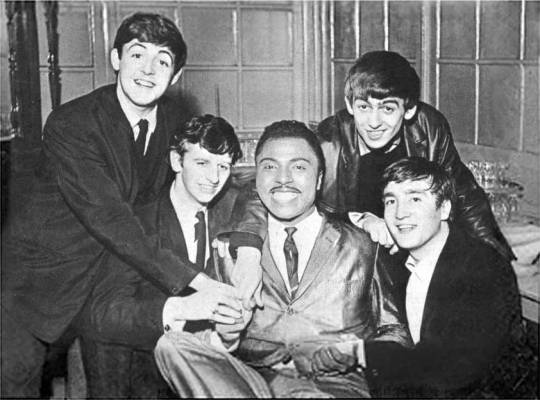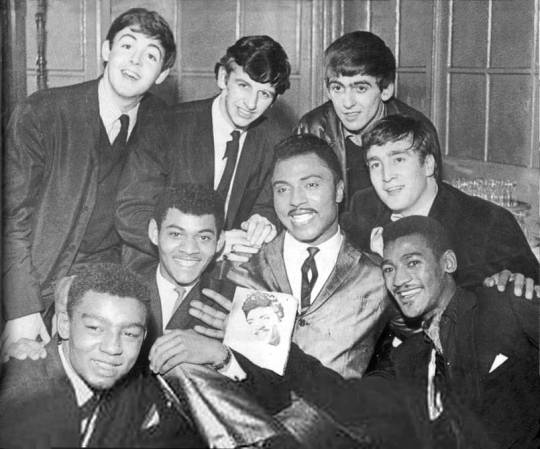Text
if you love feeling like a crazed conspiracy theorist i really cannot recommend getting into the beatles enough
294 notes
·
View notes
Text
i'm soo sorry to be that person but is there a book or interview that mentions the thing about martha biting john?
#I'm 99% sure there is not#it's possible that it's gossip that came from the apple scruffs or something#but I haven't even seen any evidence of that#it does make a nice fanfic prompt though
18 notes
·
View notes
Text



I had such a ridiculous argument with this total idiot who kept insisting that George hated Paul from India till the very end (and only did anything with him afterwards for the money) that the only way to soothe my nerves was to make these so I could watch and rewatch grumpy old man George squeezing him tight and reaching out to grab his jacket and touching his hair and grinning at him like that all the time throughout Anthology, no matter how awkward the whole situation was.
No one annoys him like Paul and no one knows him like Paul and there’s no one he loves like Paul and it’s all so painfully and wonderfully real that when I think about it for too long I have to go lie down in a dark room for a while.
536 notes
·
View notes
Text






Favourite Paul Moments (1/2) -> Standing Stone: The Documentary
247 notes
·
View notes
Text
From Rob Sheffield's article on Paul's Bowery show:
He told a great story about listening to the Sirius Beatles channel in his car and hearing a tune he fancied. “I made the driver turn it up,” Paul marveled. “He said it was a song called ‘Sweet Sweet Memories’ and I said, ‘I don’t remember that at all!’” It’s a 1993 outtake from Off the Ground. “He said it was a B side to a CD single! Do they even have B sides, CD singles? Maybe they do.”
lol at Paul having made so much music that he just forgets some of it but is still sitting there going, "hey, that's pretty good! Nice job, Past Paul!"
42 notes
·
View notes
Text


#saw this scrolling down and thought#wow that's amazing fanart#nice job paul's graphics person#guess he's in town for the snl special this weekend
171 notes
·
View notes
Text


😐
#I do like that observation#the oddness of having privacy on stage that you don't have off it#because the world is screaming so loudly they can't hear you#but also more evidence that you should never believe paul when he plays dumb
163 notes
·
View notes
Text

60s and 20s paul switching clothes
471 notes
·
View notes
Text


Backstage with Little Richard
320 notes
·
View notes
Text
7 notes
·
View notes
Text
whispering: Early Takes: Volume 1 is actually the best George album
#someone should have locked him in a room for a few years#and made him record nothing but stripped down versions#and dylan covers
0 notes
Text
Paul lived at Rosa’s small bungalow in Hamburg’s dockland for a while…accomodation was very scarce. Rosa told me: “I remember when young Paul used to practice guitar on the roof of my little place. We used to get crowds of burly old Hamburg dockers hanging around, just listening. They shouted out things in German, but Paul didn’t understand them. It’s odd—they were a very hard audience who didn’t really know what Paul was playing. But somehow they took to him.” […] Paul McCartney was my particular buddy. Every evening, when we’d finished working, Liane (one of the Hamburg barmaids) used to pick us up in her tiny Volkswagen and take us to her flat for coffee and a record session. Paul and I used to play Elvis and Everly records while Liane prepared a supper of Deutsche Beefsteak (alias hamburgers) and coffee. By the way, when I say she picked us up in the evening…well, it was really four o’clock in the morning.
(Iain Hines in Beatles Book Monthly 36+37)
#fave paul stories#who needs existentialist art students when you've got cleaning ladies and dock workers?#paul and his collection of surrogate mothers
124 notes
·
View notes
Text
(…) John made it clear that he had no intention of having any further contact with his crew after we left. He looked surprised when I told him that Tyler would be very disappointed because he was under the impression that he had become John’s close friend during the voyage. “I don’t have any friends!” John reminded me. “Friendship is a romantic illusion!” He said that he had learned this the hard way after the breakup of his relationship with Paul McCartney, whom he had once regarded as his close friend. John’s features hardened as he launched into a terse monologue on the subject. Using his relationship with Paul McCartney as an example, John asserted that most “so-called friendships” were based on a symbiotic exchange of services. “The basis of our friendship was an intuitive understanding we had as musicians,” he said. John explained that when he and Paul first started working together, he needed Paul more than Paul needed him, because in addition to being a well-rounded musician who could help John translate rough ideas into songs, Paul had a secure family background. “Being around Paul gave me a sense of stability,” John said. “When I met Yoko, I knew it was time to cut myself loose. Paul hated me for turning my back on him and did everything he could to turn the others against me. He saw that he couldn’t compete with Yoko, so he tried to stab us in the back. He was absolutely vicious, and it shattered whatever illusions I had about our so-called friendship.”
John Lennon: Living on Borrowed Time, Frederic Seaman (1991)
#thinking about paul in get back#being the one defending john and yoko#and who exactly was telling john that paul tried to stab him in the back#the needless tragedy of it all
24 notes
·
View notes
Text
“It is, he says, a city full of memories for him, from the moment he gets there. “I often arrive these days on an airplane at the John Lennon Airport,” McCartney begins to tell me, and I think that his point is going to be that even the airport has a Beatle-y name, but it’s something else, something far odder and less expected. “From the word go, there, I’m getting memories of me and John cycling to that airport to look at planes, me and George going to the Liverpool Air Show where some guy, birdman, flew out of an airplane and his parachute didn’t open,” he says. “And we watched him drop and went, ‘Uh-oh…I don’t think that was right.…’ We thought, ‘Any second now his parachute’s gonna open, and it never did. We went, ‘I don’t think he survived that.’ And he didn’t.” When McCartney tells me this, I wonder whether it’ll turn out to be one of those hazy, half-mythical recollections that don’t seem to have a real-life concordance, but it’s not. On May 21, 1956, a few weeks before McCartney’s 14th birthday, Léo Valentin, who was the most famous “birdman” of his time, and who billed himself as “Valentin, the Most Daring Man in the World,” was scheduled to fly using man-made wings in front of 100,000 spectators in Liverpool, but one of his wings hit the plane as he was exiting and was damaged, his backup parachute failed to deploy correctly, and Valentin fell to his death.”
— Chris Heath Interviews Paul Mccartney for GQ, (September 11, 2018)
#I love that the GQ interviewer starts out wanting to get paul away from his usual cliched answers#and then perhaps regrets that#'let me tell you about dead birdmen and frog massacres and circle-jerks'
207 notes
·
View notes
Text
John Dunbar: (...) The Beatles always tried to protect and defend [Brian]. Back then, Brian's homosexuality was a terrible thing and kept hidden, probably because the Beatles couldn't have him as their manager [if it were known]. Paul once said to me, "There are always rumors about me and Kenny Everett, or that Cliff Richard and I were gay." I said, "The only rumor I remember is that you were dead." SG: I'd forgotten that he was dead. JD: Yeah, but he remembered instantly. I called him up at his farm in Scotland and I said, "Paul, I hear you're dead." He said, "Not true."
All You Need is Love: The End of the Beatles, Peter Brown & Steven Gaines (2024)
208 notes
·
View notes
Text
"Well, believe it or don't, I don't really care what you believe. What I do care about is that the one outlet that I had has been taken from me, and that is no fun. I'm not really mad at her [Yoko], you know. I want to yell at her because I'm still popular, and I can't do anything about it. Sound funny? Look!" He held up an envelope. "This is from Francis Coppola. He wants me to do a score for a film he's working on. He says, 'I'm living in a volcano and it's wonderful. Wish you were here. Want to work on a movie?' Here's another one. Frank Perry wants a little Lennon touch on his Time and Time Again. It's a time-travel movie. Just my thing, right? But I don't have any music in me. Here's a guy who wants an interview, but I don't have anything to say. I got three offers here to perform, one to produce, and a million letters that just want to know how I'm doin'. That's popularity. And I don't have anything to give them, so I have to write back nice polite letters saying ‘Thanks but no thanks' because on the off chance I ever do get out of this slump or block or whatever it is, if I ever do get the muse back, then I'm gonna need all these people. "So, you know what I say? I tell them that bit you and Yoko thought up for the Immigration press last year. I tell them that I'm fully employed minding the baby and playing househusband. Now that lie is getting a little stale. People have to wonder, don't they? I'm a bit surprised no one has caught on yet. 'He's got a maid, and a nanny, and a cook, and gofers, I wonder what it is that keeps him so busy?' But the public will believe what the public wants to believe. So I'm a househusband. And it galls the hell out of me to turn down offers that I'm dying to accept and am incapable of fulfilling."
John Lennon talking about losing his muse, as told by John Green in Dakota Days (1983)
#this always makes me think of linda saying#“he was desperate to write"#and that paul could have helped him
87 notes
·
View notes
Text


happy its like you and me are lovers 24th of january
981 notes
·
View notes